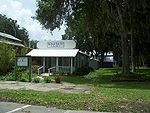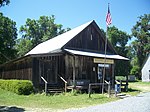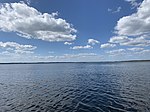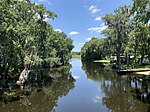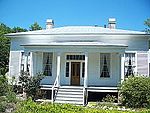McIntosh Historic District
Historic districts on the National Register of Historic Places in FloridaMarion County, Florida geography stubsNRHP infobox with nocatNational Register of Historic Places in Marion County, FloridaNorth Central Florida Registered Historic Place stubs ... and 1 more
Use mdy dates from August 2023

The McIntosh Historic District is a U.S. historic district (designated as such on November 18, 1983) located in McIntosh, Florida. The district is bounded by the former Atlantic Coast Line Railroad High Springs—Croom Line Right-of-Way, 10th Street, Avenues C and H. It contains 75 buildings. Contributing properties in the district include the McIntosh Presbyterian Church. Though the Seaboard Coast Line Railroad abandoned the railroad line by 1982, both the passenger station and freight station still exist as contributing properties. U.S. Route 441 runs directly through the district one block east of 10th Street.
Excerpt from the Wikipedia article McIntosh Historic District (License: CC BY-SA 3.0, Authors, Images).McIntosh Historic District
Avenue G,
Geographical coordinates (GPS) Address Nearby Places Show on map
Geographical coordinates (GPS)
| Latitude | Longitude |
|---|---|
| N 29.449166666667 ° | E -82.219722222222 ° |
Address
Avenue G 5867
32664
Florida, United States
Open on Google Maps
